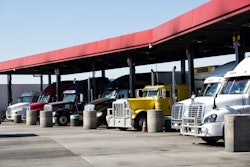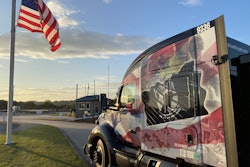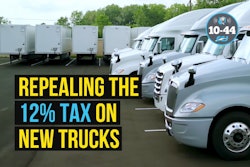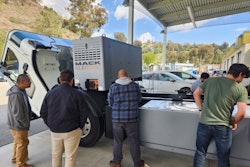Trucking news and briefs for Thursday, June 19, 2025:
One-day brake-focused inspection blitz sidelines 400 trucks
Inspectors in 45 jurisdictions throughout the United States, Canada and Mexico conducted 4,569 commercial motor vehicle inspections and placed 398 (8.7%) of those vehicles out of service due to brake-related violations as part of the Commercial Vehicle Safety Alliance’s unannounced one-day brake-safety inspection and enforcement blitz.
CVSA’s Brake Safety Day is an unannounced brake-safety inspection and regulatory compliance enforcement initiative when inspectors conduct their routine roadside inspections with a focus on brake systems and components, and provide brake-related inspection and violation data to CVSA.
Of the 4,569 inspections conducted on April 22, 4,171 commercial motor vehicles did not have any brake-related out-of-service violations -- 91.3% of the total number of vehicles inspected. Conversely, inspectors identified 398 (8.7%) commercial vehicles with brake-related critical vehicle violations. Those trucks were immediately placed out of service until the violations were addressed.
This year, emphasis was placed on vehicles’ drums and rotors -- the same focus area as the upcoming Brake Safety Week in August. Thirty-two (8%) trucks had drum/rotor violations during the one-day event. Of those violations, 14 resulted in the vehicle or combination being placed out of service.
[Related: CVSA sets dates for annual Brake Safety Week]
Inspectors identified 237 (59.5%) commercial vehicles that met the 20% defective brakes criterion, which is when 20% or more of the vehicle’s (or combination of vehicles’) brakes have an out-of-service condition.
In addition, inspectors identified 77 out-of-service violations related to brake hoses and/or tubing; 48 trucks had steering axle out-of-service violations; 38 failed an air loss rate test; and there were 112 other out-of-service brake violations, such as worn brake lines/hoses, inoperative tractor protection system, inoperative low-air warning device, air leaks, hydraulic fluid leaks, etc.
In nine U.S. jurisdictions, inspectors utilized a performance-based brake tester (PBBT) on Brake Safety Day and conducted 100 PBBT Inspections. A PBBT is a machine that assesses the braking performance of a vehicle. U.S. Federal Motor Carrier Safety Regulations and CVSA’s North American Standard Out-of-Service Criteria require a minimum braking efficiency of 43.5%. Eight trucks tested with a PBBT failed to meet the required 43.5% minimum braking efficiency rate and were placed out of service.
[Related: How well do you know the 20% rule for brake violations?]
Kodiak selects Roush to upfit trucks with autonomous Kodiak Driver system
Autonomous truck technology developer Kodiak Robotics will work with Roush Industries to scale upfitting of autonomous trucks equipped with the Kodiak Driver, Kodiak’s advanced AI-powered autonomous solution.
Starting in the second half of 2025, Roush will upfit these trucks in its facility in Livonia, Michigan. The first trucks Roush will upfit are expected to be for Kodiak’s customer, Atlas Energy Solutions, as Kodiak and Atlas work to expand the driverless operations they began in December 2024.
In collaboration with Kodiak, Roush has committed to open a production line for scaled upfitting of trucks equipped with the Kodiak Driver’s modular and vehicle-agnostic hardware. This hardware includes Kodiak’s proprietary SensorPods, AI compute, Actuation Control Engine safety compute, and redundant actuation elements. Roush has also committed to design, develop and implement a flexible manufacturing process that can rapidly scale as Kodiak increases its upfit of Kodiak Driver-powered trucks to meet customer demand.
“Kodiak’s autonomous trucking technology is an exciting advancement in the mobility industry,” said Brad Rzetelny, VP Contract Manufacturing, Roush. “Together we’re working to build a robust and repeatable manufacturing process that supports Kodiak’s transition from limited production to full-scale deployment. Kodiak’s technology and engineering rigor set a high bar, and we believe we are uniquely positioned to meet that bar at scale.”
In December 2024, Kodiak became the first publicly announced company to deliver driverless semi-trucks to a customer. In April, Kodiak announced it is seeking to go public through a business combination with Ares Acquisition Corporation II. The proposed business combination is expected to close in the second half of 2025, subject to approval by AACT and Kodiak stockholders and the satisfaction or waiver of customary closing conditions. Upon the closing of the proposed business combination, the combined company is expected to be listed on a national stock exchange.
[Related: Atlas Energy adds two more Kodiak autonomous trucks to fleet]
Oversize/overweight trucking group’s HOS waiver provisionally renewed
The Federal Motor Carrier Safety Administration is renewing a waiver that exempts certain oversize/overweight (OS/OW) truck drivers from the required 30-minute break in the hours-of-service regulations.
The exemption has been held by the Specialized Carriers & Rigging Association (SC&RA) since June 2015 and was last renewed in June 2020 and officially expired on June 17. FMCSA, in a Federal Register notice publishing Friday, June 20, provisionally renewed the exemption for six months.
The exemption covers drivers working for specialized carriers transporting loads that exceed normal weight and dimensional limits and require a permit issued by a state or local government agency. According to SC&RA, the 30-minute break uniquely affects OS/OW loads and has exacerbated the number of instances in which drivers have had to park these loads at roadside, consequently impacting the safety of both the general public and the driver.
Because hours in which an OS/OW load can travel are restricted by permit requirements, those hours will often conflict with the timing of the required 30-minute rest break. SC&RA specifically cited four instances demonstrating this conflict.
“Finding suitable parking for trucks with OS/OW loads is particularly difficult as SC&RA pointed out, and the default option is likely to be parking on the shoulder of a highway, with the load sometimes extending into the lanes of traffic,” FMCSA noted in its provisional renewal. “No matter how well marked, trucks parked at roadside, especially at night, are too often mistaken for moving vehicles and struck, frequently with fatal consequences, before an inattentive driver can correct his or her mistake.”
The agency added that if evidence of insufficient safety is not provided during the six-month provisional renewal period, it anticipates granting a full five-year exemption on or before the provisional exemption expires. FMCSA will accept comments on the provisional renewal and potential full five-year renewal beginning June 20 at www.regulations.gov by searching Docket No. FMCSA-2014-0420.
Paper Transport expands partnership with NFL franchise
Paper Transport (CCJ Top 250, No. 108) announced this week an expanded partnership with the Green Bay Packers. For the past nine seasons, Paper Transport has hauled the Packers’ equipment for away games across the United States, playing a vital role in the team’s operational success.
The newly expanded partnership goes beyond logistics to include joint efforts in talent recruitment and brand visibility as a trusted, dedicated transportation partner, and building a winning culture for future generations.
Celebrating the values, service and shared commitment to excellence between two proudly Wisconsin-based organizations, the partnership includes designation as “A Dedicated Transportation Partner of the Green Bay Packers.”
“For the past nine years, our drivers have worked to ensure the Packers’ gear arrives safely and on time- no matter the opponent, distance, or the conditions,“ said Tyler Ellison, CEO of Paper Transport. “To be formally recognized as ‘A Dedicated Transportation Partner of the Packers’ is a tremendous honor for our team. It’s a reflection of the pride our people take in their work and the purpose that drives us every day: to the most trusted and admired dedicated provider in North America.”
With a fleet of more than 750 trucks, 850 professional drivers, and a team serving customers nationwide, Paper Transport’s evolution as a dedicated carrier continues to accelerate. This partnership creates new opportunities to celebrate the professional drivers and support teams who help make it happen, not just on game day, but every day.
“We’re thrilled to team up with Paper Transport and showcase the incredible work they do right here in Northeastern Wisconsin and beyond,” said Justin Wolf, Director of Corporate Partnership Sales & Activations for the Green Bay Packers. “We’re proud to be on the same team and look forward to the great things we’ll accomplish together.”












